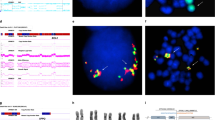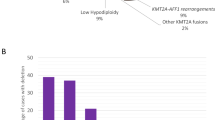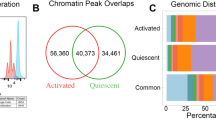Abstract
Angioimmunoblastic T-cell lymphoma (AILT) and peripheral T-cell lymphoma, unspecified (PTCL-u) are relatively frequent subtypes of T- or natural killer cell lymphoma. To characterize the structural anomalies of chromosomes associated with these disorders, we here determined chromosome copy number alterations (CNAs) and loss of heterozygosity (LOH) at >55 000 single nucleotide polymorphism loci for clinical specimens of AILT (n=40) or PTCL-u (n=33). Recurrent copy number gain common to both conditions was detected on chromosomes 8, 9 and 19, whereas common LOH was most frequent for a region of chromosome 2. AILT- or PTCL-u-specific CNAs or LOH were also identified at 21 regions, some spanning only a few hundred base pairs. We also identified prognosis-related CNAs or LOH by several approaches, including Cox's proportional hazard analysis. Among the genes that mapped to such loci, a poor prognosis was linked to overexpression of CARMA1 at 7p22 and of MYCBP2 at 13q22, with both genes being localized within regions of frequent copy number gain. For a frequent LOH region at 2q34, we also identified IKAROS family zinc-finger 2 cDNAs encoding truncated proteins. Our data indicate that AILT and PTCL-u consist of heterogeneous subgroups with distinct transforming genetic alterations.
This is a preview of subscription content, access via your institution
Access options
Subscribe to this journal
Receive 12 print issues and online access
$259.00 per year
only $21.58 per issue
Buy this article
- Purchase on SpringerLink
- Instant access to full article PDF
Prices may be subject to local taxes which are calculated during checkout





Similar content being viewed by others
Accession codes
References
Rudiger T, Weisenburger DD, Anderson JR, Armitage JO, Diebold J, MacLennan KA et al. Peripheral T-cell lymphoma (excluding anaplastic large-cell lymphoma): results from the Non-Hodgkin's Lymphoma Classification Project. Ann Oncol 2002; 13: 140–149.
Fischer P, Nacheva E, Mason DY, Sherrington PD, Hoyle C, Hayhoe FG et al. A Ki-1 (CD30)-positive human cell line (Karpas 299) established from a high-grade non-Hodgkin's lymphoma, showing a 2;5 translocation and rearrangement of the T-cell receptor beta-chain gene. Blood 1988; 72: 234–240.
Poiesz BJ, Ruscetti FW, Gazdar AF, Bunn PA, Minna JD, Gallo RC . Detection and isolation of type C retrovirus particles from fresh and cultured lymphocytes of a patient with cutaneous T-cell lymphoma. Proc Natl Acad Sci USA 1980; 77: 7415–7419.
Harabuchi Y, Yamanaka N, Kataura A, Imai S, Kinoshita T, Mizuno F et al. Epstein–Barr virus in nasal T-cell lymphomas in patients with lethal midline granuloma. Lancet 1990; 335: 128–130.
Jaffe ES, Harris NL, Stein H, Vardiman JW (eds). Pathology and Genetics of Tumours of Haematopoietic and Lymphoid Tissues. IARC Press: Lyon, 2001, 225–229.
Lengauer C, Kinzler KW, Vogelstein B . Genetic instabilities in human cancers. Nature 1998; 396: 643–649.
Kralovics R, Passamonti F, Buser AS, Teo SS, Tiedt R, Passweg JR et al. A gain-of-function mutation of JAK2 in myeloproliferative disorders. N Engl J Med 2005; 352: 1779–1790.
Renedo M, Martinez-Delgado B, Arranz E, Garcia M, Urioste M, Martinez-Ramirez A et al. Chromosomal changes pattern and gene amplification in T cell non-Hodgkin's lymphomas. Leukemia 2001; 15: 1627–1632.
Zettl A, Rudiger T, Konrad MA, Chott A, Simonitsch-Klupp I, Sonnen R et al. Genomic profiling of peripheral T-cell lymphoma, unspecified, and anaplastic large T-cell lymphoma delineates novel recurrent chromosomal alterations. Am J Pathol 2004; 164: 1837–1848.
Thorns C, Bastian B, Pinkel D, Roydasgupta R, Fridlyand J, Merz H et al. Chromosomal aberrations in angioimmunoblastic T-cell lymphoma and peripheral T-cell lymphoma unspecified: a matrix-based CGH approach. Genes Chromosomes Cancer 2007; 46: 37–44.
Matsuzaki H, Dong S, Loi H, Di X, Liu G, Hubbell E et al. Genotyping over 100 000 SNPs on a pair of oligonucleotide arrays. Nat Methods 2004; 1: 109–111.
Nannya Y, Sanada M, Nakazaki K, Hosoya N, Wang L, Hangaishi A et al. A robust algorithm for copy number detection using high-density oligonucleotide single nucleotide polymorphism genotyping arrays. Cancer Res 2005; 65: 6071–6079.
Redon R, Ishikawa S, Fitch KR, Feuk L, Perry GH, Andrews TD et al. Global variation in copy number in the human genome. Nature 2006; 444: 444–454.
Komura D, Shen F, Ishikawa S, Fitch KR, Chen W, Zhang J et al. Genome-wide detection of human copy number variations using high-density DNA oligonucleotide arrays. Genome Res 2006; 16: 1575–1584.
Drexler HG . Review of alterations of the cyclin-dependent kinase inhibitor INK4 family genes p15, p16, p18 and p19 in human leukemia-lymphoma cells. Leukemia 1998; 12: 845–859.
Oshiro A, Tagawa H, Ohshima K, Karube K, Uike N, Tashiro Y et al. Identification of subtype-specific genomic alterations in aggressive adult T-cell leukemia/lymphoma. Blood 2006; 107: 4500–4507.
Nakamura S, Nakamura S, Matsumoto T, Yada S, Hirahashi M, Suekane H et al. Overexpression of caspase recruitment domain (CARD) membrane-associated guanylate kinase 1 (CARMA1) and CARD9 in primary gastric B-cell lymphoma. Cancer 2005; 104: 1885–1893.
Takasaki Y, Yamada Y, Sugahara K, Hayashi T, Dateki N, Harasawa H et al. Interruption of p16 gene expression in adult T-cell leukaemia/lymphoma: clinical correlation. Br J Haematol 2003; 122: 253–259.
Schmitt CA, McCurrach ME, de Stanchina E, Wallace-Brodeur RR, Lowe SW . INK4a/ARF mutations accelerate lymphomagenesis and promote chemoresistance by disabling p53. Genes Dev 1999; 13: 2670–2677.
Attygalle A, Al-Jehani R, Diss TC, Munson P, Liu H, Du MQ et al. Neoplastic T cells in angioimmunoblastic T-cell lymphoma express CD10. Blood 2002; 99: 627–633.
Kelley CM, Ikeda T, Koipally J, Avitahl N, Wu L, Georgopoulos K et al. Helios, a novel dimerization partner of Ikaros expressed in the earliest hematopoietic progenitors. Curr Biol 1998; 8: 508–515.
Hahm K, Cobb BS, McCarty AS, Brown KE, Klug CA, Lee R et al. Helios, a T cell-restricted Ikaros family member that quantitatively associates with Ikaros at centromeric heterochromatin. Genes Dev 1998; 12: 782–796.
Tabayashi T, Ishimaru F, Takata M, Kataoka I, Nakase K, Kozuka T et al. Characterization of the short isoform of Helios overexpressed in patients with T-cell malignancies. Cancer Sci 2007; 98: 182–188.
Nakase K, Ishimaru F, Fujii K, Tabayashi T, Kozuka T, Sezaki N et al. Overexpression of novel short isoforms of Helios in a patient with T-cell acute lymphoblastic leukemia. Exp Hematol 2002; 30: 313–317.
Guo Q, Xie J, Dang CV, Liu ET, Bishop JM . Identification of a large Myc-binding protein that contains RCC1-like repeats. Proc Natl Acad Sci USA 1998; 95: 9172–9177.
Melendez B, Diaz-Uriarte R, Cuadros M, Martinez-Ramirez A, Fernandez-Piqueras J, Dopazo A et al. Gene expression analysis of chromosomal regions with gain or loss of genetic material detected by comparative genomic hybridization. Genes Chromosomes Cancer 2004; 41: 353–365.
Yamamoto G, Nannya Y, Kato M, Sanada M, Levine RL, Kawamata N et al. Highly sensitive method for genomewide detection of allelic composition in nonpaired, primary tumor specimens by use of affymetrix single-nucleotide-polymorphism genotyping microarrays. Am J Hum Genet 2007; 81: 114–126.
Niitsu N, Okamoto M, Nakamine H, Aoki S, Motomura S, Hirano M . Clinico-pathologic features and outcome of Japanese patients with peripheral T-cell lymphomas. Hematol Oncol 2008; e-pub ahead of print.
Attygalle AD, Kyriakou C, Dupuis J, Grogg KL, Diss TC, Wotherspoon AC et al. Histologic evolution of angioimmunoblastic T-cell lymphoma in consecutive biopsies: clinical correlation and insights into natural history and disease progression. Am J Surg Pathol 2007; 31: 1077–1088.
Jost PJ, Ruland J . Aberrant NF-kappaB signaling in lymphoma: mechanisms, consequences, and therapeutic implications. Blood 2007; 109: 2700–2707.
Zhang Z, Swindle CS, Bates JT, Ko R, Cotta CV, Klug CA . Expression of a non-DNA-binding isoform of Helios induces T-cell lymphoma in mice. Blood 2007; 109: 2190–2197.
Sun L, Heerema N, Crotty L, Wu X, Navara C, Vassilev A et al. Expression of dominant-negative and mutant isoforms of the antileukemic transcription factor Ikaros in infant acute lymphoblastic leukemia. Proc Natl Acad Sci USA 1999; 96: 680–685.
Bahram F, von der Lehr N, Cetinkaya C, Larsson LG . c-Myc hot spot mutations in lymphomas result in inefficient ubiquitination and decreased proteasome-mediated turnover. Blood 2000; 95: 2104–2110.
Chang SC, Tucker T, Thorogood NP, Brown CJ . Mechanisms of X-chromosome inactivation. Front Biosci 2006; 11: 852–866.
Carrington JC, Ambros V . Role of microRNAs in plant and animal development. Science 2003; 301: 336–338.
Carninci P, Kasukawa T, Katayama S, Gough J, Frith MC, Maeda N et al. The transcriptional landscape of the mammalian genome. Science 2005; 309: 1559–1563.
Takada S, Berezikov E, Yamashita Y, Lagos-Quintana M, Kloosterman WP, Enomoto M et al. Mouse microRNA profiles determined with a new and sensitive cloning method. Nucleic Acids Res 2006; 34: e115.
Acknowledgements
This study was supported in part by a grant for Third-Term Comprehensive Control Research for Cancer from the Ministry of Health, Labor, and Welfare of Japan as well as by a grant for Scientific Research on Priority Areas ‘Applied Genomics’ from the Ministry of Education, Culture, Sports, Science, and Technology of Japan.
Author information
Authors and Affiliations
Corresponding author
Additional information
Disclosure/Conflict of interest
The authors declare no competing financial interests.
Supplementary Information accompanies the paper on the Leukemia website (http://www.nature.com/leu)
Rights and permissions
About this article
Cite this article
Fujiwara, Si., Yamashita, Y., Nakamura, N. et al. High-resolution analysis of chromosome copy number alterations in angioimmunoblastic T-cell lymphoma and peripheral T-cell lymphoma, unspecified, with single nucleotide polymorphism-typing microarrays. Leukemia 22, 1891–1898 (2008). https://doi.org/10.1038/leu.2008.191
Received:
Revised:
Accepted:
Published:
Issue date:
DOI: https://doi.org/10.1038/leu.2008.191
Keywords
This article is cited by
-
Peripheral T cell lymphomas: from the bench to the clinic
Nature Reviews Cancer (2020)
-
Molecular heterogeneity in peripheral T-cell lymphoma, not otherwise specified revealed by comprehensive genetic profiling
Leukemia (2019)
-
Epigenetically regulated miR-1247 functions as a novel tumour suppressor via MYCBP2 in methylator colon cancers
British Journal of Cancer (2018)



